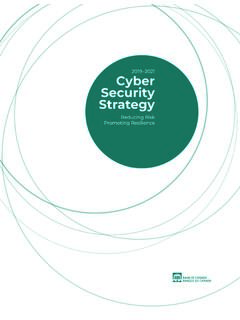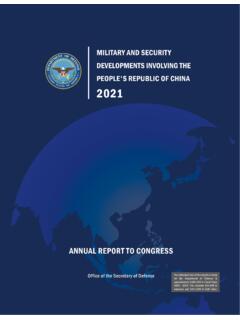Transcription of National Cyber Security Strategy 2016-2021 - Progress …
1 National Cyber Security Strategy 2016 - 2021 Progress ReportAutumn 2020 Crown copyright 2020 Produced by Cabinet OfficeYou may re-use this information (excluding logos) free of charge in any format or medium, under the terms of the Open Government view this licence, visit or email: we have identified any third party copyright material you will need to obtain permission from the copyright holders format versions of this report are available on request Cyber Security Strategy 2016 - 2021 | Progress Report | Autumn 20202 ContentsForeword 4 Introduction 5 Key achievements over the past year 7 Progress against strategic outcomes 10 Planning beyond 2021 37 National Cyber Security Strategy 2016 - 2021 | Progress Report | Autumn 2020 3 National Cyber Security Strategy 2016 - 2021 | Progress Report | Autumn 20204 ForewordPaymaster GeneralIn this, the penultimate year of our five-year National Cyber Security Strategy , the impact of the COVID-19 pandemic has reinforced the importance of ensuring the Security of the UK s of us have been relying more heavily on digital technology to work, shop and socialise.
2 It has been an empowering and liberating force for good at a time when people have felt confined. It has been a lifeline keeping people connected with family and friends, ensuring the most vulnerable receive medicines and food deliveries and is underpinning the operational delivery of our ongoing response to the alongside the clear benefits technology brings come growing opportunities for criminals and other malicious actors, here and abroad, to exploit Cyber as a means to cause us harm. That is why the role of this Strategy and the diverse range of talented and committed Cyber Security professionals across all sectors of our economy are so important in keeping citizens and services want to thank those professionals, particularly those in the National Cyber Security Centre and law enforcement for the important role they have played in defending the UK against an unprecedented increase in Cyber threats during the in previous years, this Progress report is an opportunity to take stock and showcase successes like these, as well as look ahead to the future.
3 The UK s departure from the European Union presents new opportunities to define and strengthen our place in the world as a sovereign and independent country. That includes how we tackle existing and emerging Cyber Security threats at a time when the global landscape is changing approach to Cyber Security Strategy post 2021 will reinforce the outcome of the current Integrated Review of the UK s foreign, defence, Security and development policy. It will ensure we can continue to defend the UK against evolving Cyber threats, deter malicious actors, develop the Cyber skills and Cyber sector we need and build on the UK s international leadership, influence and action on Cyber Security in the years Rt Hon Penny Mordaunt MP,Paymaster GeneralNational Cyber Security Strategy 2016 - 2021 | Progress Report | Autumn 2020 5 IntroductionThe global landscape has changed significantly since the publication of the National Cyber Security Strategy Progress Report in May 2019 .
4 We have seen unprecedented levels of disruption to our way of life that few would have predicted. The COVID-19 pandemic has increased our reliance on digital technologies for our personal communications with friends and family and our ability to work remotely, as well as for businesses and government to continue to operate effectively, including in support of the National new ways of living and working highlight the importance of Cyber Security , which is also underlined by wider trends. An ever greater reliance on digital networks and systems, more rapid advances in new technologies, a wider range of threats, and increasing international competition on underlying technologies and standards in cyberspace, emphasise the need for good Cyber Security practices for individuals, businesses and the scale and international nature of these changes present challenges, there are also opportunities. With the UK s departure from the European Union in January 2020, we can define and strengthen Britain s place in the world as a global leader in Cyber Security , as an independent, sovereign sustained, strategic investment and whole of society approach delivered so far through the National Cyber Security Strategy has ensured we are well placed to respond to this changing environment and seize new opportunities.
5 National Cyber Security Strategy 2016 - 2021 | Progress Report | Autumn 20206 Over the past year we have: Enhanced our capabilities and services to defend the UK against evolving Cyber threats, particularly in the COVID-19 context, while maintaining our world-leading ability to respond effectively to incidents, and to make UK networks, data and systems protected and resilient. Consolidated our law enforcement response, from National to local level, to deter malicious actors so the UK remains a hard target for all forms of aggression in cyberspace. Continued to develop Cyber skills and the Cyber sector through initiatives aimed at promoting innovation in our dynamic, growing Cyber Security industry. Underpinning this we have taken international action to influence and shape the global evolution of cyberspace in a manner that advances our wider economic and Security interests, working with a coalition of partners to respond to and deter state-directed malicious Cyber , in the final year of the National Cyber Security Strategy , we will continue to deliver against these objectives, while supporting the government s vision for the UK s role in the world over the next Cyber Security Strategy 2016 - 2021 | Progress Report | Autumn 2020 7 Key achievements over the past year Defend our people, organisations and infrastructure The National Cyber Security Centre (NCSC) responded to over 600 Cyber incidents in 2019 and over 700 in 2020, providing support to almost 1,200 victim organisations and handling over 2,500 incidents since commencing operations.
6 Launched the Suspicious Email Reporting Service (SERS), which successfully went live in April 2020. In the first four months of operation the service has received million reports from members of the public. These reports have enabled the National Cyber Security Centre to get 22,000 malicious URLs and 9,300 malicious web links taken down. Supported essential service providers retailers, charities and other organisations deemed essential to the UK s response to COVID-19 helping almost 1,200 of them to ensure their services are protected as far as possible from Cyber attacks. Launched the Cyber Aware campaign to help the public and small businesses stay secure online during COVID-19, and published new guidance on secure home working, online shopping and secure use of video conferencing. Provided additional protection to over 150 significant NHS networks during COVID-19 and engaged with 50 pharmaceutical companies and universities involved in vaccine development, treatment, testing, epidemiology studies and modelling, most notably for the two leading UK-based vaccine projects at the University of Oxford and Imperial College.
7 Delivered technical exercising programmes in the civil nuclear sector to improve our preparedness for Cyber attacks. Published a Cyber Security toolkit to help businesses in the space sector to identify and mitigate their Cyber risk. Gained acclaim for developing the basis of the first globally applicable industry standard on consumer Internet of Things Validated our work on organisational barriers to good Cyber Security via our Call for Evidence in November and December 2019 , which generated over 130 responses. Evaluated the impact, costs and benefits of the first 18 months of the Network and Information Systems Regulations in improving Cyber Security of key (ETSI Technical Specification 103 645) National Cyber Security Strategy 2016 - 2021 | Progress Report | Autumn 20208 Deter our adversaries The National Crime Agency, Regional Organised Crime Units and local police forces carried out over 1,000 disruptions in the past year, more than doubling figures from the previous year.
8 Launched, consolidated and integrated the Force Specialist Cyber Crime Units into all 43 forces in England and Wales, so now all police forces have specialist officers in place to investigate Cyber crime and provide victim support. Grew the international coalition willing to work with us to respond to and deter state-directed malicious Cyber activity, including by publicly attributing a range of Cyber incidents. For example, in February 2020, the UK, along with 22 countries plus the EU and NATO, called out the Russian GRU for attacks on Georgia in 2019 . Developed the evidence base for sanctions listings under the new Cyber sanctions regime with EU partners. Built a Commonwealth network of 47 countries to improve cross-border cooperation and the handling of digital evidence for criminal our research, skills and industry Helped grow the Cyber Security sector by supporting business through accelerators. In 2019 there were approximately 1,200 firms active within the UK providing Cyber Security products and services, an increase of 44% since 2018.
9 UK Cyber Security exports were worth billion in 2019 , representing 55% of total UK Security exports (the largest single category) compared with billion in 2018. 2019 was a record year for Cyber Security investment, with 348 million in fundraising across 80 deals. To respond to the challenges of young people studying at home, we delivered a new Virtual Cyber School, which provides a free online platform for up to 20,000 students aged 13 to 18 years. Our world-leading CyberFirst Bursary programme continues to grow and attract highly motivated, talented undergraduates. There are 750 students in the scheme, with 180 to be onboarded. All 56 bursary students who graduated so far are now in full-time Cyber Security Cyber Security Strategy 2016 - 2021 | Progress Report | Autumn 2020 9 International Initiated cross-government Cyber dialogues with 20 new countries, in addition to continuing longer-standing bilateral engagements.
10 Grew our network of overseas Cyber officers. By the end of FY 2020-21 we should have 20 full-time regional Cyber leads across five continents, on top of our network of 70+ part time Cyber officers. Continued to support the Global Cyber Security Capacity Centre (GCSCC) in Oxford University and its world-leading model to assess Cyber Security capacity maturity. This allows nations to benchmark their Cyber Security capacity and set priorities for developing their Cyber Security capabilities. Over 80 assessments using the model have now been completed, with at least 15 completed in the last year. Bolstered the Commonwealth Cyber Declaration through capacity-building activity during the UK s Chair-in-Office. Ninety-six events were held in 31 countries, and over 1,500 people trained during the UK s Chair-in-Office period. Funded specific overseas campaigns, for example Get Safe Online s million online safety awareness campaign in the Caribbean, which reached over 1 million people in 12 countries, who are now better equipped to protect themselves from Cyber attacks.
















